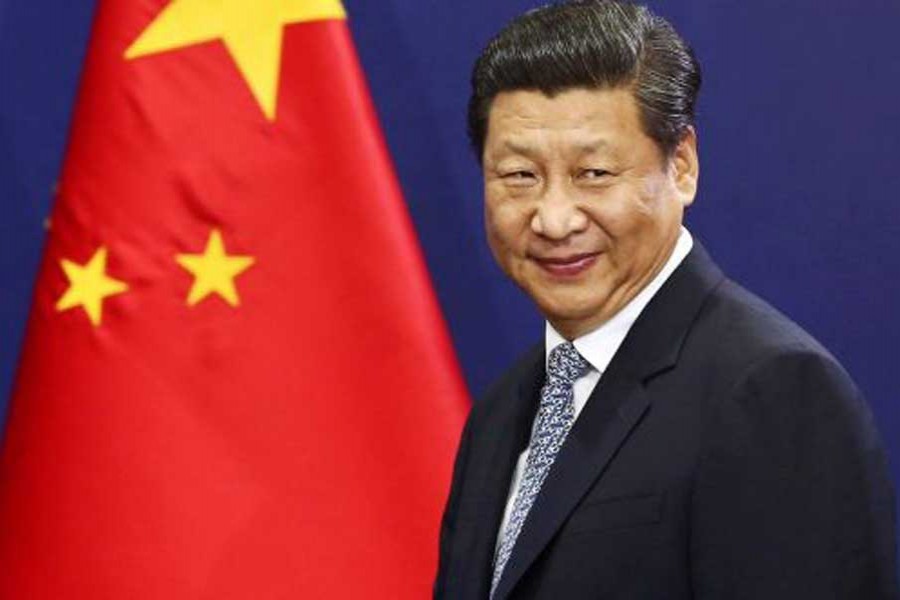Elevating China into a global leader status is not done lightly, in spite of overwhelming evidence of how this is panning out: it has barged into the leadership playground, climbing up the ladder so rapidly that everyday news tends to be about which country it has overtaken (in productivity, investment, resources, innovative capacities, and so forth), until finally only one country remains perched above it, the United States. Even here a consensus may be emerging: not if this will happen, but when China will be a top-flight country. A World Economic Forum report forecasts how China's $11 trillion GDP (gross domestic product) tally in 2017, which trails only the United States, and by a $8.0 trillion margin, will more than triple to $38 trillion by mid-century, placing it $15 trillion ahead of second-fiddle United States.
Mesmerising as those numbers and the race may be, they depict a scramble so starkly different from prior leadership contests. The two that come to mind and pose fewer comparative qualms are Great Britain and the United States. As Robert Gilpin cogently narrated (in US Multinational Power, 1975), Pax Brittanica of the 19th Century and Pax Americana of the 20th Century used military/political order as the necessary condition and economic/technological as the sufficient conditions. Without a navy 'ruling the waves' the world over, from London, Gibraltar, Singapore, and Hong Kong, Great Britain would not have an empire where the 'sun would never set', let alone markets for its manufactured exports and raw materials for its own industries; and likewise, for the United States after World War II, without a North Atlantic Treaty Organisation and a briefcase accompanying the president with a nuclear-button, it would have been too uphill for West European countries, Japan, and Latin American US neighbours to recover, even with the $13 billion 1948-51 European Recovery Plan (Marshall Plan: worth 10 times more today), the $72 billion 1945-52 Supreme Command for Asia-Pacific for Japan, and the $20 billion 1961-9 Alliance for Progress's Latin push, respectively, against an expanding communist dynamo.
Just looking around the globe today, we are hard pressed to find any Chinese military/political strong-points globally, let alone facilitating its economic progress. Economic prowess, in fact, allowed it to build South China Sea islands, establish the Djibouti naval base, and take over Sri Lanka's Hambantoto Port.
China's grand-daddy economic investment, the Belt and Road Initiative (BRI), has a full-fledged economic premise: a past Great Silk Route. Though developed in fits and starts against a strategic master plan fulcrum, it capitalised upon low-waged exports to build the trillion-dollar reserve to strengthen a commensurate military flank. In other words, the necessary condition was economic/technological, with military/political resources/capabilities serving as the sufficient conditions. Estimated to cost between $4.0 and $8.0 trillion, one can see how that was itself premised upon two decades of cut-throat market-pricing and trade surpluses.
What does that mean for world leadership? First and foremost, since economic/technical capabilities pose lesser threat than military/political under broader, short-term considerations, China has been making fewer outright enemies than the United States, or even Great Britain, did. Terms like 'white man's burden' or 'the ugly American' have not been hurled at China, even though not every country has been happy with China's very imperialistic approach (posting higher interest rates for loans than the World Bank, and so on).
This opens up a second implication: with the need for relatively fewer ships and soldiers posted abroad than Britain and the United States had during the 'ascent' phase of their leadership, China is sowing fewer seeds of future confrontations, regardless of how ingratiating Chinese entrepreneurs and economic experts stationed abroad might be.
Thirdly, unlike Britain and the United States, China's potential leadership not only began but has also been cultivated within a nuclear-laden context, that is, capabilities that have such overkill capacities that using them imposes more constraints than building them, thus permitting China to get its economic house in order without fears of gunboat diplomacy or economic sanctions.
A flip side of that exposes the fourth implication: China's 'rise' to world leadership corresponds to the global economy being either stalled or awaiting an impetus, which differs from the growing competition Britain found in the 19th Century to build its own empire under trade protectionism, or to face embedded protectionism as the United States did to expand free trade. In fact, Britain's growth was less dependent on economic relations with its rival powers (though this was a creditable component), just as US growth benefited more from opening or creating new markets (Germany, Japan) than feeding any potential rival. When China entered the US economic realm, it was because the United States needed an economic spurt at a depressed economic moment (1980s), indeed, the global economy needed to be adrenalised in a way Britain and the United States did not face during their 'ascent'.
Finally, China's largest partner eventually became the very country it was going to displace: only through gargantuan trade surpluses with that country (and US investments in China dwarfing all other sources) could China build its enormous disposable income (and profit from US technologies).
Among the lessons that can be drawn: first, world leadership carries many more facets than just military power, each inter-changeable rather than fixed; second, 'eastern' and 'southern' literatures joining 'western' literatures more concertedly to accurately interpret ongoing dynamics; third, no matter the 20th Century progresses in promoting collective action, self-help still rules in the 21st Century; and fourth, without a firm world leader, instability remains the world's guttural condition.
Dr. Imtiaz A. Hussain is Professor & Head of the newly-built Department of Global Studies & Governance at Independent University, Bangladesh.


